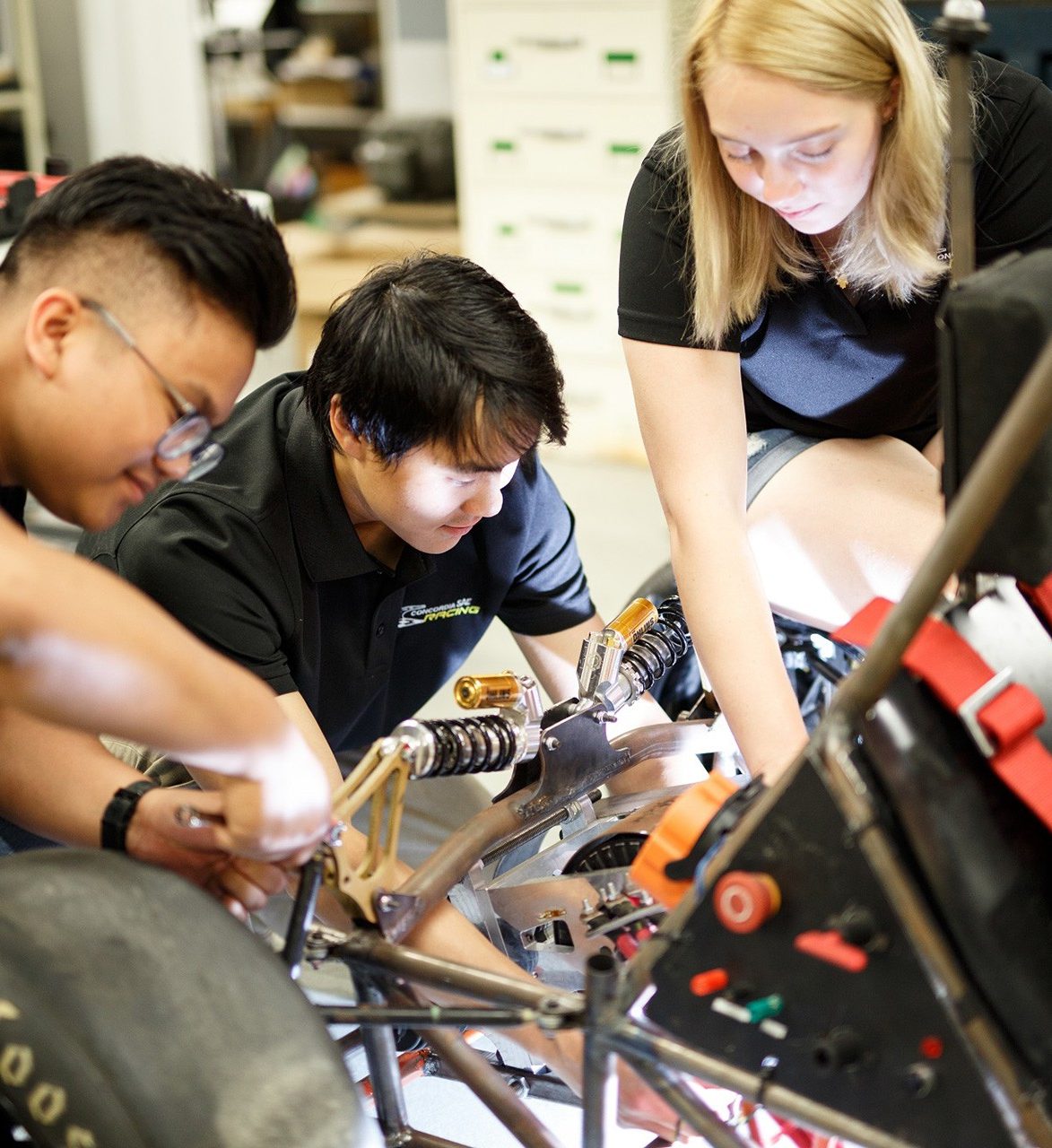
Careers with a mechanical engineering degree
Studying mechanical engineering means learning how individual parts form together to make efficient, safe and practical systems in the real world. You’ll be taught to design, build and control machines from engines and robots to entire assembly lines.
What can I do with my degree? You’ll be equipped for careers in automotive, aerospace, manufacturing and robotics, designing systems that are efficient, safe and built to last.
Skills you'll develop
Your degree builds more than academic knowledge, it shapes the way you think, communicate and collaborate. Throughout your studies, you'll develop key skills for your career, such as:
Functional knowledge:
Apply thermodynamics, fluid mechanics and material science to design and analyze machines, engines and HVAC systems
Communication:
Turn technical ideas into clear reports and presentations for classmates, professors and industry partners
Management and organization:
Balance course loads with extracurricular activities, labs and internships
Teamwork:
Work in design teams to tackle engineering challenges like building robots or energy systems
Critical thinking and problem solving:
Troubleshoot design failures or test results by analyzing root causes and proposing alternate solutions
As a Concordia student, you will develop valuable skills to bring to any career opportunity.
Beyond the classroom: build your career path
Getting involved outside of the classroom can help you discover your interests, develop new skills and build a network of peers and professionals in your field.
First year
- Get one-on-one support with your math courses from a math tutor.
- Attend learning services workshops to learn how to effectively approach problem-solving and manage time during exams.
- Explore research opportunities and labs within the MIAE department.
- Get involved with student groups like the Canadian Society for Mechanical Engineer (CSME) or other student societies to connect with peers in your field.
- Improve your language fluency in French or English through conversation sessions.
- Consider Co-op or a Career Edge internship to gain professional work experience during your program.
Middle years
- Connect with Career Counselling & Education Transitions to start planning your career path.
- Consider taking graduate-level courses if you are planning on pursuing a graduate program at Concordia after your degree.
- Visit the Gina Cody School Makerspace if you need specialized equipment for 3D printing, woodworking, metal working or electronics.
- Browse the CAPS online job bank for opportunities to gain work experience.
- Start thinking about your Capstone project and how to make the most of your final year.
Final year
- Learn about the process of becoming an engineer in Quebec.
- Apply to be a teaching assistant to gain experience.
- Tune into The Iron Ring Podcast to explore cutting-edge topics and industry insights.
- Prepare to present your capstone or pitch an idea with FutureBound’s public speaking and storytelling workshops.
- Network with potential employers at recruitment events and career fairs.
Specialize your studies
Program elective groups
Customize your degree with one of these elective groups:
- Aerospace
- Design and Manufacturing
- Systems and Mechatronics
- Thermo-Fluids and Propulsion
- Vehicle Systems
- Stress Analysis
Graduate studies and certifications
Graduate studies can help you specialize in a subject you love, engage in meaningful research or open doors to new career paths. Certifications are a great way to build new skills that complement your degree.
Talk to your professors or a career counsellor at the Student Success Centre to find programs that fit your goals.
Start exploring:
- Integrated path in Mechanical Engineering: Begin graduate-level coursework while completing your bachelor’s degree.
- Universitystudy.ca: A data base of graduate programs in Canada
- Concordia’s School of Graduate Studies: Graduate programs offered at Concordia
- Graduate funding and awards: Scholarships and awards, research and teaching assistantships, and other financial supports for Concordia graduate students
- Concordia Continuing Education: Courses, workshops and programs to advance your career
Career exploration resources
Professional organizations
Explore opportunities and expand your network.
- Engineers Canada
- Ordre des ingénieurs du Québec
- Association of Consulting Engineering Companies Canada (ACEC)
- Canadian Society for Mechanical Engineering
- Engineering Institute of Canada
- American Society of Mechanical Engineers
- Institution of Mechanical Engineers
- National Society of Professional Engineer
- American Society of Heating, Refrigerating and Air-Conditioning Engineers
Job banks
Career counselling & advising
Want tailored career advice? Book an appointment with one of our career counsellors or career advisors.
Start your job search
Career Advising and Professional Success (CAPS) can help you find opportunities and support you with networking, applications and interviews.

